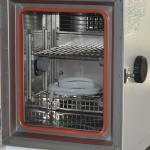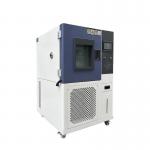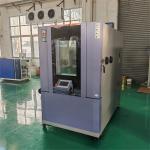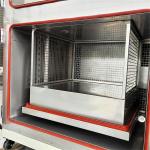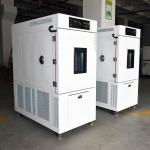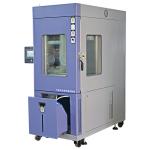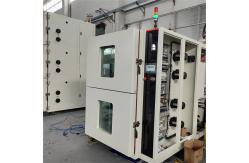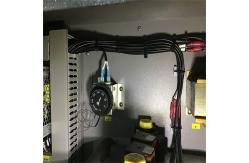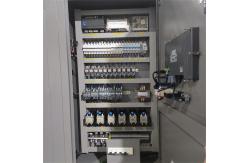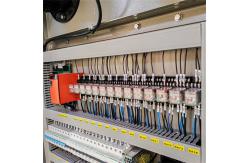In the modern laboratory landscape, the Lab Constant Temperature
Humidity Environmental Climatic Test Chamber is a cornerstone of
accurate and reliable experimentation. This sophisticated piece of
equipment is designed to create and maintain highly stable and
precisely controlled environmental conditions, enabling researchers
and scientists to conduct a wide range of tests with utmost
precision and confidence. The Lab Constant Temperature Humidity Environmental Climatic Test
Chamber is specifically engineered to provide a consistent and
adjustable environment in terms of temperature and humidity. It
serves as an essential tool across multiple scientific disciplines
and industries, including pharmaceuticals, biotechnology,
electronics, materials science, and more. In pharmaceutical
research, it is used to study the stability and shelf life of drugs
by subjecting them to different temperature and humidity profiles
that mimic real-world storage and transportation conditions. In
electronics, it helps assess the performance and durability of
components and devices under various environmental stressors,
ensuring their reliability in diverse applications. - Robust and Insulated Chamber Construction
- The test chamber is constructed with high-quality, durable
materials that offer excellent resistance to corrosion and wear.
The chamber walls are made of thick, insulated panels that minimize
heat transfer and maintain a stable internal temperature. The
interior surface is smooth and non-reactive, preventing any
interaction with the samples being tested and ensuring the
integrity of the experimental results. The insulation also plays a
crucial role in achieving precise humidity control by reducing the
risk of condensation and moisture leakage.
- The door of the chamber is designed with a reliable sealing
mechanism to create an airtight enclosure. It is equipped with a
heavy-duty hinge and a secure locking system, allowing for easy
access while maintaining the integrity of the internal environment.
The door typically features a large viewing window, often made of
tempered glass, which enables researchers to monitor the samples
without disturbing the test conditions.
- Precision Temperature and Humidity Control Systems
- The temperature control system is highly advanced and accurate. It
can maintain a wide temperature range, usually from -40°C to +100°C
or even wider in some models. The temperature accuracy is within
±0.2°C, ensuring precise and consistent testing. The system
utilizes a combination of heating and refrigeration elements, along
with a sophisticated feedback loop and temperature sensors
strategically placed throughout the chamber to ensure uniform
temperature distribution. It can also achieve rapid temperature
changes, allowing for efficient thermal cycling experiments.
- The humidity control system is equally precise. It can adjust the
relative humidity from 10% to 95% RH with an accuracy of ±1% RH.
The chamber is equipped with a high-efficiency humidifier and
dehumidifier, which work in tandem to achieve rapid and accurate
humidity adjustments. The system may use ultrasonic or steam-based
humidification methods and condensation or desiccant
dehumidification techniques, depending on the specific design. This
allows for the creation of a wide variety of humidity conditions,
simulating everything from arid to highly humid environments.
- Advanced Instrumentation and Data Acquisition
- The chamber is outfitted with a suite of high-quality sensors.
Temperature sensors are distributed evenly within the chamber to
monitor any temperature gradients and ensure a homogeneous thermal
environment. Humidity sensors provide real-time data on the
relative humidity levels. These sensors are connected to a
state-of-the-art data acquisition system that records and stores
all the measured parameters. The data can be accessed and analyzed
in real-time or retrieved later for in-depth studies.
- The control panel of the chamber is user-friendly and intuitive. It
allows researchers to easily set the desired temperature and
humidity levels, as well as program complex test sequences. The
panel displays all the relevant information, including current
temperature, humidity, and the status of the control systems. It
also has built-in alarms and safety features to alert operators in
case of any abnormal conditions or system failures.
| Model | JTC-80 | JTC-150 | JTC-225 | JTC-408 | JTC-800 | JTC-1000 | | Inside dimension(W x D x H) mm | 40 x 50 x40 | 50 x 60 x 50 | 50 x 75 x 60 | 60 x 85 x 80 | 100 x 100 x 80 | 100 x 100 x 100 | | Outside dimension(W x D x H) mm | 95 x 140 x 95 | 105 x 150 x 105 | 105 x 165 x 115 | 115 x 175 x 140 | 155 x 190 x 140 | 155 x 190 x 160 | | Internal material | #304 Stainless Steel | | External material | Powder coated #304 Stainless Steel | | Temperature range | + 150℃~ - 70 ℃ | | Humidity range | 10% ~ 98% R. H | | Temperature Uniformity ℃ | 0.01 | | Humidity Uniformity % R. H. | 0.1 | | Temperature stability ℃ | ±0.3 | | Humidity stability % R. H. | ±2 | | High temperature ℃ | 100 | 100 | 100 | 100 | 100 | 100 | | Heating time (min) | 20 | 30 | 30 | 30 | 30 | 30 | | Low temperature | 0, -40, -70 | 0, -40, -70 | 0, -40, -70 | 0, -40, -70 | 0, -40, -70 | 0, -40, -70 | | Cooling time (min) | 20, 50, 70 | 20, 50, 70 | 20, 50, 70 | 20, 50, 70 | 20, 50, 70 | 20, 50, 70 | | Air circulation system | Mechanical convection system | | Cooling system | Imported compressor, fin evaporator, gas condenser | | Heating system | Sus304 Stainless steel High-speed heater | | Humidification system | Steam Generator | | Humidification water supply | Reservoir, Sensor-controller solenoid valve, recovery-recycle
system | | Controller | Touch panel | | Electrical power requirements | Please contact us for requirements of specific models | | Accessories | Multi-layer enhanced glass window,test hole, action indicator
light, case lighting barrier shelf x2 | | Safety device | Circuit system load protection, compressor load protection, control
system load protection, humidifier load protection, overtemperature
load protection, fault warning light |
- Accurate Environmental Simulation
- The primary function of the test chamber is to accurately simulate
different temperature and humidity environments. By precisely
controlling these parameters, it allows researchers to evaluate how
samples will behave in various real-world scenarios. This helps in
optimizing product designs, selecting appropriate materials, and
improving manufacturing processes. For example, in the development
of new packaging materials, the chamber can be used to test how
they protect the contents under different temperature and humidity
conditions, leading to the creation of more effective packaging
solutions.
- The ability to create complex environmental profiles, such as
cyclic temperature and humidity changes, is also a valuable
function. This can help in identifying potential weaknesses or
failure points in samples that may not be apparent under static
conditions. For instance, in the automotive industry, components
can be tested under cyclic temperature and humidity conditions to
simulate the changes they experience during different seasons and
driving conditions.
- Compliance with Industry Standards and Regulations
- Many industries have strict standards and regulations regarding
product testing in specific environmental conditions. The Lab
Constant Temperature Humidity Environmental Climatic Test Chamber
is a reliable tool for ensuring compliance. For example, in the
pharmaceutical industry, products need to meet certain temperature
and humidity requirements to ensure their safety and efficacy. By
using this chamber to conduct tests in accordance with relevant
standards like ICH, USP, or GMP, manufacturers can prove that their
products meet the necessary criteria, facilitating market access
and enhancing consumer confidence.
- Regulatory bodies rely on accurate test results obtained from such
chambers to enforce safety and quality regulations. It serves as a
dependable means for inspectors and certifying agencies to
determine the suitability of products for use in different
applications.
- Research and Development Support
- In the field of research and development, this chamber is an
invaluable asset. It allows scientists and engineers to conduct
fundamental studies on the effects of temperature and humidity on
new materials and technologies. For example, in the development of
new polymers, the chamber can be used to evaluate how different
temperature and humidity conditions affect their mechanical,
chemical, and physical properties. This data can then be used to
optimize the material formulatio
|
